Select Studies in Martin Luther’s Life and Influence (29 vols.)
Digital Logos Edition
Overview
The Select Studies in Martin Luther’s Life and Influence (29 vols.) features a host of perspectives on the extraordinary life and works of Martin Luther. One of the most significant individuals in Western history and a key figure in the Protestant Reformation, Luther has been both praised and vilified for what he preached and wrote. This collection offers essential texts such as Gustaf Wingren’s classic, Luther on Vocation, and provides fresh insight on many aspects of Luther’s life and theology. Explore his doctrine of the church, notion of Christian liberty, views on worship, and beliefs about the Sacrament of Communion. Discover new research on his mother’s influence in his life and see the significance of his devotional writings in a new light. Learn about his transition from medieval Catholicism, read a selection of Luther’s political writings, and immerse yourself in studies on Luther’s thought in relation to historicism, German cultural revolution, and the English Reformation. Covering a rich variety of subjects within Lutheran studies, this collection enables you to deepen your understanding of Luther and his legacy.
Interested in more? You can shop these two separate collections with isolated titles, The Select Studies in Martin Luther’s Life Part 1 (15 vols.) and The Select Studies in Martin Luther’s Life Part 2 (14 vols.).

- Analyzes many aspects of Luther’s life and theology
- Provides fresh insights on long-standing debates within Lutheran studies
- Examines Luther’s thinking on education, politics, and vocation
- Includes a variety of perspectives and methodological approaches
- Title: Select Studies in Martin Luther’s Life and Influence
- Publisher: Wipf & Stock
- Volumes: 29
- Pages: 6,356
- Grace and Reason: A Study in the Theology of Luther by B. A. Garish
- Being Shaped by Freedom: An Examination of Luther’s Development of Christian Liberty, 1520-1525 by Brett James Muhlhan
- Martin Luther: The Problem with Faith and Reason: A Reexamination in Light of the Epistemological and Christological Issues by David Andersen
- Luther as a Spiritual Adviser: The Interface of Theology and Piety in Luther’s Devotional Writings by Dennis Ngien
- Martin – God’s Court Jester: Luther in Retrospect by Eric W. Gritsch
- Luther On Education by F. V. N. Painter
- Luther On Vocation by Gustaf Wingren
- Luther as an Educator by Gustav M. Bruce
- The Theology of Martin Luther by H. H. Kramm
- The Righteousness of Faith According to Luther by Hans J. Iwand
- The Communion of Saints: A Study of the Origin and Development of Luther’s Doctrine of the Church by Herman Amberg Preus
- This Is My Body: Luther’s Contention for the Real Presence in the Sacrament of the Altar by Herman Sasse
- Luther and His Mother by Ian Siggens
- Martin Luther: His Life and Teachings by James A. Nestingen
- Martin Luther: Prophet to the Church Catholic by James Atkinson
- The Great Light: Luther and the Reformation by James Atkinson
- Martin Luther’s Two Ways of Viewing Life and the Educational Foundation of a Lutheran Ethos by Leonard S. Smith
- Religion and the Rise of History: Martin Luther and the Cultural Revolution in Germany, 1760-1810 by Leonard S. Smith
- A Sure Ground on Which to Stand: The Relation of Authority and Interpretive Method in Luther’s Approach to Scripture by Mark D. Thompson
- Luther: Selected Political Writings edited by J. M. Porter
- Luther in English: The Influence of His Theology of Law and Gospel on Early English Evangelicals (1525-35) by Michael S. Whiting
- Luther’s Revolution: The Political Dimensions of Martin Luther’s Universal Priesthood by Nathan Montover
- Cross Narratives: Martin Luther’s Christology and the Location of Redemption by Neal J. Anthony
- Engaging Luther: A (New) Theological Assessment Olli-Pekka Vainio
- Cross in Tensions: Luther’s Theology of the Cross as Theologico-social Critique Philip Ruge-Jones
- Let God Be God: An Interpretation of the Theology of Martin Luther by Philip S. Watson
- Luther Discovers the Gospel: New Light Upon Luther’s Way from Medieval Catholicism to Evangelical Faith by Uuras Saarnivaara
- Luther On Worship: An Interpretation Vilmos Vajta
- Experience and Faith: The Significance of Luther for Understanding Today’s Experiential Religion by William Hordem
This title is included in the following collections
You can save when you purchase this product as part of a collection.
Logos 6 Lutheran Gold Legacy L...
$849.99$849.99Logos 5 Lutheran Gold Legacy L...
$849.99$849.99Logos 6 Lutheran Platinum Lega...
$1,499.99$1,499.992025 Lutheran Diamond
$2,999.99$2,249.99
- $4,749.99$3,562.49
- $4,749.99
- $4,749.99
- $23,999.99$17,999.99
- $24,999.99
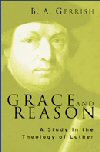
Grace and Reason: A Study in the Theology of Luther
- Author: B. A. Gerrish
- Publisher: Wipf & Stock
- Publication Date: 2005
- Pages: 200
In this volume, author B. A. Gerrish examines Luther’s thoughts on human reason—reason before the Fall, reason after the Fall, and reason as it operates in a believer, the concept of ratio, and much more. Gerrish’s thorough exploration sheds light on Luther’s position regarding both the importance and limitations of human reason.
B. A. Gerrish is John Nuveen Professor Emeritus and professor of historical theology at the University of Chicago Divinity School.
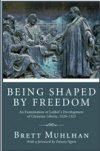
Did Luther get Christian freedom right? In this volume, author Brett James Muhlhan seeks to find the answer to this question by examination of two elements: What is Luther’s understanding of Christian freedom? How did his understanding stand up under the pressure of reformation? Muhlhan explores both of these elements and contends that the sublime beauty of Luther’s early understanding of Christian freedom—an understanding that empowered the German reformation—is consistently the same understanding he used to undermine papal heteronomy and refute radical legalism. Throughout this text, Muhlhan shares insight on how the relational character, cruciform substance, and complex structure of Luther’s concept of freedom enabled him to speak both polemically and catechetically with a clear and authoritative clarity that reinvoked the magnificence of Christ and him crucified for sinners.
This well-researched and well-written book is a unique contribution to Luther studies. No other work so clearly and creatively demonstrates how Luther’s concept of inner freedom works out in the early, difficult social situations the reformer faced. Being Shaped by Freedom is a courageous attempt to argue for and to elucidate the consistency between the reformer’s practice and the indicative of reforming doctrine.
—Michael Parsons, Spurgeon’s College
With clarity, precision, and insightful sensitivity, Muhlhan . . . examines how Luther’s understanding of justification and freedom produces the faithful life of the believer. This refreshing analysis contributes significantly to our understanding of the holistic view of Christian righteousness fashioned by Luther’s distinctions of law and gospel and of two kinds of human righteousness. This book shows how Luther’s insights actually functioned in his proclamation aimed at shaping Christian consciousness and performance of God’s will.
—Robert Kolb, Concordia Seminary
Brett Muhlhan displays a comprehensive knowledge of the principles and materials treated, lucidity in communicating that knowledge, and originality and independence in applying them . . . Throughout, he shows a talent for sound theological exposition, and an analytic gift to unearth the complex structure and substance of Luther’s thinking . . . This monograph, a substantial study of high quality, deserves an ecumenical reception.
—From the foreword by Dennis Ngien, Tyndale Seminary
Brett James Muhlhan is postgraduate coordinator and lecturer in historical theology, systematics, and New Testament at the Perth Bible College, western Australia.
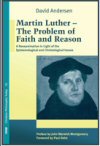
In this book, David Andersen offers a fresh re-evaluation of Luther and his understanding of the relationship between faith and reason based on a thorough engagement with Luther’s mature writings. Andersen persuasively argues that, far from being either an irrationalist or a fideist, Luther stands within an empiricist tradition and that his pronouncements on fallen human reason can be understood only from that philosophical perspective. Based upon recent research into the writings of William of Ockham, who positively influenced Luther in this area, Andersen also shows that Luther can no longer be charged as a pessimist concerning human knowledge. He shows how reason has an important role to play for Luther in bringing people to faith, and the objectivity of Christ’s resurrection serves as the focal point that validates all Christian discourse. Andersen’s text sets forth the position that in subordinating itself to the facts of the death and resurrection of Christ for the forgiveness of sins, Luther believed reason’s created function is restored to some extent, as it receives that forgiveness in the words of Holy Scripture and the visible means of Baptism and the Lord’s Supper.
Luther has long been regarded, both by secular philosophers and by misguided believers, as an irrationalist....A careful reading of Dr. Andersen’s book will surely give the lie to all existentialisings of the Reformer. It will also demonstrate that Luther cannot be classified as one who would today replace insistence on clear thinking with post-modern refusals to allow, even in principle, the establishing of objective truth.
—John Warwick Montgomery, distinguished research professor of apologetics and Christian thought, Patrick Henry College, Virginia.
The result of this many-sided approach to the Reformer is a refreshingly positive re-evaluation of Luther’s estimate of reason and of the often-reproduced portrait of Luther as fideistic and pessimistic. This new orientation also succeeds in revealing the complexity of Luther’s thought, its nuances as well as its tensions, and the fact that he thinks of reason and faith on various levels. Reason is majestic, but it is to be subordinate to the will of God. It is majestic, but it is also fragmented and distorted by the Fall.
—Paul Helm, teaching fellow, philosophical theology, Regent College
David Andersen earned his PhD in philosophy and theology at Wycliffe Hall, Oxford and Coventry University. He was formerly assistant professor of philosophy and theology at Concordia University, Ann Arbor.
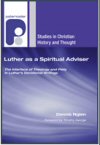
Luther as a Spiritual Adviser: The Interface of Theology and Piety in Luther’s Devotional Writings
- Author: Dennis Ngien
- Publisher: Wipf & Stock
- Publication Date: 2007
- Pages: 206
In this volume Dennis Ngien unfolds the pastoral, not the polemical, side of the Luther, drawing on the spiritual insights he offers to people of high and low estate. These writings are devotional and catechetical in shape and intent, yet not devoid of rich theological substance, the fruit of his rigorous reflections. They are the exercises of Luther’s basic calling as a theologian-pastor, and are the concrete illustrations of the interface of theology and piety. As Ngien argues, through these writings, readers are informed not only of the Reformation theology of justification, but also introduced to a distinct expression of the Christian faith in which Christ and his cross occupy the centre stage.
Reformation theology, like most if not all theology prior to the birth of the university, was done in the church, by the church, for the church. As such, it could never be separated from the pastoral context in which most of its great proponents labored. This is above all true of the great Martin Luther, and Dr. Ngien is to be thanked for an exciting and stimulating monograph on just this topic. It is my hope that this timely book will help to recover the pastoral theological importance of Luther for a new generation.
—Carl R. Trueman, professor of historical theology and church history, Westminster Theological Seminary, Philadelphia
Dennis Ngien is founder of the Centre for Mentorship and Theological Reflection and a research professor of theology at Tyndale Seminary, Toronto. He is the author of several books including Apologetic for Filioque in Medieval Theology and Interpretation of Love: God’s Love and Ours.
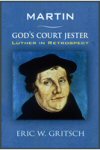
Martin—God’s Court Jester: Luther in Retrospect
- Author: Eric W. Gritsch
- Publisher: Wipf & Stock
- Publication Date: 2009
- Pages: 304
In this volume, author Eric Gritsch thoroughly explores the life of Martin Luther, providing a detailed account of the course of his life. His rigorous scholarship sheds light on many facets of Luther’s work, as well as the Lutheran Reformation.
Gritsch has provided us with a full-scale, one-volume biography of Luther. The work is meticulously documented and the bibliography at the end will alone warrant the price of the book
—Roland H. Bainton, former Titus Street Professor of ecclesiastical history, Yale University
This book will be an invaluable source of information for students of the Lutheran Reformation. Ecumenists will find in its pages a great resource in their efforts to deal with issues that have been church—divisive.
—Carl J. Peter, Catholic University of America
Eric W. Gritsch (PhD, Yale) was emeritus professor of church history at the Gettysburg Lutheran Seminary. He authored several books, including The Boy from the Burgenland: From Hitler Youth to Seminary Professor, The Wit of Martin Luther, Toxic Spirituality: Four Enduring Temptations of Christian Faith.
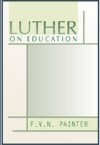
Originally published in 1889, this text is “an examination of all that [Luther wrote] about education” and an “attempt to arrange in . . . systematic form his educational opinions and principles.” Painter’s thorough study of Luther’s ideas about education also includes four chapters of helpful historical introduction to the time in which Luther lived. Painter explores how Luther’s writings on education are not only significant to the study of Luther himself, but also crucial to the study of educational progress, as “Luther brought about as important a reformation in education as in religion.”
F. V. N. Painter was professor of modern languages at Roanoke College. He also wrote A History of Education.
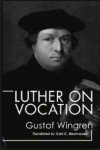
In this classic text, noted theologian Gustaf Wingren provides a comprehensive analysis of Luther’s writings and teaching on the doctrine of vocation, elucidating the very practical and essential nature of Luther’s thought on the complex concept of vocation.
Gustaf Wingren’s conscientious analysis of Luther’s teaching on the matter...remains our prime resource for the understanding of the relation of faith and works. Nothing could exceed the patience and thoroughness with which Wingren has combed through the Luther corpus.... [I]t will serve to put the full range of Luther’s insight at the disposal of those who care for theology as part of their care of all the Churches.
—Alexander Miller, former professor of religion, Stanford University
Gustaf Wingren was a Swedish theologian, and professor of systematic theology at Lund University from 1951–1977. His other books include Creation and Law, Gospel and Church, and The Living Word.
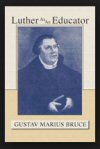
Luther as an Educator
- Author: Gustav M. Bruce
- Publisher: Wipf & Stock
- Publication Date: 2002
- Pages: 320
Martin Luther is noted to once have remarked: “[y]ou parents can provide no better gift for your children than an education in the liberal arts. House and home burn down, but an education is easy to carry along.” Well-versed in the classics, Luther frequently commended a liberal arts education, and held a position as professor of biblical literature during his life. In this text, Gustav Bruce discusses Luther in his role as an educator, illuminating his relevancy to education today.
Gustav M. Bruce is also the author of Ten Studies in Church History, Ten Studies on the Lutheran Church, The Apostolic Church, and Ten Studies on the Sunday School.
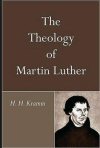
The Theology of Martin Luther
- Author: H. H. Kramm
- Publisher: Wipf & Stock
- Publication Date: 2009
- Pages: 152
Luther’s ideas are puzzling to many. Catholics of various types may consider him to be the arch-Protestant; strict Protestants (including many British nonconformists) consider him to be half-Roman in outlook. His conservatism in Church order and liturgical forms may endear him to some Anglicans, while he annoys others by his insistence that neither prayer books nor ecclesiastical formularies can create Church unity but that unity of doctrine is the indispensable condition for union. In this text, H. H. Kramm sets out to interpret Luther for minister and layman alike, in an unbiased, scholarly way, while stressing Luther’s importance to contemporary thought. He puts special emphasis on questions such as: What was Luther’s attitude to morals and good works? Does “salvation by faith alone” mean that it is enough to hold a certain intellectual belief, no Christian life being required? What does he teach about peace and war; about Church and State, about political responsibility? What are his ideas about Church and ministry, about sacraments, about episcopacy and “apostolic succession”? Does Luther treat the Bible arbitrarily? Was he an anti-Semite, did he spread blind nationalism or racial hatred? What was his attitude to human reason, scholarship and free will? And many more.
Hans Herbert Kramm earned a Doctor of Divinity from Mansfield College, Oxford University with his thesis on Martin Luther. Originally from Germany, he came to England in the years between World War I and II as a liason officer from the Confessing Church. He also started a congregation at Oxford, made up of primarily German refugees.
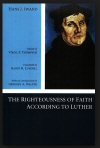
The Righteousness of Faith According to Luther
- Author: Hans J. Iwand
- Publisher: Wipf & Stock
- Publication Date: 2008
- Pages: 116
Hans Joachim Iwand’s 1941 monograph, The Righteousness of Faith According to Luther, is an important contribution to contemporary appreciation of Luther’s theological significance. Although Iwand wrote his study three decades after the beginning of the Luther Renaissance, it nevertheless developed some of the central insights of Luther scholarship during that period. Two concepts—in particular, promise and simultaneity—are crucial to an appreciative understanding of Luther’s doctrine of justification. The language of promise presents justification to the believer as a reality that has yet to arrive or is hidden under present reality. And the language of simultaneity attests that humans remain throughout their lives one in the same, sinner and saint. This beautiful translation by Randi H. Lundell makes Iwand’s down-to-earth presentation of the doctrine at the heart of Luther’s theology, at long last, available to English-language readers.
Though not as celebrated, Hans Joachim Iwand was once described as the greatest Lutheran theologian of the twentieth century. A close friend of Karl Barth’s, Iwand tested his heritage in the fires of Barth’s critique. This tempering is evident in seminal work on Luther’s doctrine of justification by faith and the distinction of law and gospel. I heartily recommend this volume as a starting point in studying Iwand and hope that it is the beginning of a new interest in his legacy.
—James Nestingen, Professor Emeritus of church history, Luther Seminary
The appearance of this book in English is long overdue. Prior to the appearance of these essays in Lutheran Quarterly, little of Iwand had been translated into English and he was largely unknown in North America except, perhaps, from his influence on the thinking of Gerhard Forde. Hans Joachim Iwand’s theological career was forged by an early and ongoing critical engagement with Barth, the necessity of confessional witness in the face of Hitler, and by a profound grasp of the heart of Luther's theology. Like Luther, Iwand's theological work is geared toward the proclamation of the righteousness of faith found only in Christ Jesus. Thus, the fundamental and critical distinction for theology is the distinction between the law and the gospel. Here Iwand is radically and refreshingly Lutheran in a way that deconstructs moralisms of the left and the right so that Christ alone is preached as the end of the law for all who believe. The Righteousness of Faith According to Luther is more than just another historical study of a Reformation theme; it is a vigorous exercise in pastoral dogmatics. Iwand teases out the nuances in Luther's distinction of the law from the gospel with provocative insights on nearly every page. This is a volume not simply for Reformation scholars but for seminarians, pastors and thoughtful laity. I look forward to using it in the classroom and beyond.
—John T. Pless, assistant professor of pastoral ministry and Missions, Director of Field Education, Concordia Theological Seminary, Fort Wayne, Indiana
Hans J. Iwand (1899–1960), professor of theology at Gottingen and Bonn, was a prominent scholar of the Luther Renaissance. He made important contributions to the contemporary understanding of Luther’s significance to theology today.
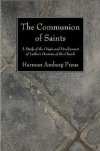
The Communion of Saints: A Study of the Origin and Development of Luther’s Doctrine of the Church
- Author: Herman Amberg Preus
- Publisher: Wipf & Stock
- Publication Date: 2008
- Pages: 172
In this text, Herman Amberg Preus presents the case that Christian churches, divided and scattered over the earth, need to rediscover that there is one catholic and apostolic Church, the Communion of Saints. Growing up in a generation that struggled to find its way back to this Scriptural Doctrine of the Church, he argues that the solution is to be found in the theology of Luther and the Reformation. Preus puts forth that World Lutheranism and the Ecumenical Movement would benefit from the guidance of Luther.
Herman Amberg Preus (1825–1894) was born in Kristiansand, Norway and graduated from the University of Oslo in 1848 after studying theology. After immigrating to the United States in 1851, he became pastor of Spring Prairie Lutheran Church in Wisconsin. He became one of seven organizers of the Norwegian Evangelical Lutheran Church in America, and served as the president of the Norwegian Synod from 1862 to 1894.
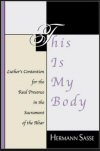
This is My Body: Luther’s Contention for the Real Presence in the Sacrament of the Altar
- Author: Hermann Sasse
- Publisher: Wipf & Stock
- Publication Date: 2001
- Pages: 432
Originally published in 1959, this text from prolific author and theologian Hermann Sasse examines Luther’s assertion of the real presence of Christ in the Sacrament of Communion. Sasse explores the origin of the Eucharistic Dogma in the Medieval period, Luther’s foundation for his doctrine in Scripture, contention with other reformers, the ensuing conflicts, and much more.
Hermann Sasse (1895–1976) was a Lutheran theologian and author. Originally from Germany, he taught at the University of Erlangen, and was an active participant in the ecumenical movement. He also was involved in writing the Bethel Confession of 1933 with Dietrich Bonhoeffer and others. Sasse spent the latter half of his life in Australia where he was part of the faculty at the seminary of the United Evangelical Lutheran Church of Australia.
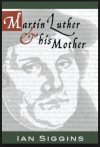
Luther and His Mother
- Author: Ian Siggins
- Publisher: Wipf & Stock
- Publication Date: 2003
- Pages: 96
In this text Ian Siggins presents a new understanding of the formative role that Martin Luther’s mother played in his verbal, spiritual, and psychological development. Siggins begins with a discussion of the traditional portrait of Hanna Luder, including a review and the resolution of the debate about Hanna’s maiden name. Next, he looks at a much less technical and more colorful controversy involving Luther’s mother. He describes the social background and achievements of Hanna’s family, and relates details of young Martin’s contact with that family during his impressionable adolescent years. Siggins pays special attention to the preaching that Luther heard in the circle of his maternal relatives. Finally, he examines Luther’s mature writings for traces of his mother’s influence.
Ian Siggins is adjunct professor in the medical school at the Unviersity of Queensland and chief executive of Siggins Miller. He received his PhD from Yale University, and was formerly a Fulbright Scholar, and Fellow of the National Endowment for the Humanities. He taught for many years at Harvard and Yale Universities.
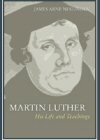
Martin Luther: His Life and Teachings
- Author: James A. Nestingen
- Publisher: Wipf & Stock
- Publication Date: 2004
- Pages: 80
This book offers a fundamental analysis of Luther’s life and theological witness. Writing in an accessible style, James Nestingen introduces the reader to many facets of Luther’s background and the influences upon him. This simple, straightforward guidebook to Luther also features a discussion of his “Small Catechism” with each part of the catechelical text preceded by interpretive comments and a description of the context in which it was written. An afterword illustrates points of tension between Luther and the contemporary world.
James A. Nestingen is professor of church history at Luther Seminary, St. Paul, MN. Nestingen has many published works and lectures on Luther’s catechisms and confessional Lutheran theology. He is also the author of Martin Luther: A Life, Manger in the Mountains, The Faith We Hold.
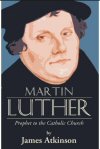
Martin Luther: Prophet to the Catholic Church
- Author: James Atkinson
- Publisher: Wipf & Stock
- Publication Date: 2004
- Pages: 226
Written in the five-hundredth year after the birth of Luther, James Atkinson argues that the time is ripe for a completion of Luther’s work, a fulfillment of Reformation goals—a reunified, truly catholic Church. In this provocative text, he contends that changes in Roman Catholic theology since the sixteenth century have brought it very nearly to the point that Luther wished it to attain. He goes on to argue that the crucially important reforms initiated by the Second Vatican Council in 1965 indicate a new spirit of ecumenical openness to a rapprochement with the separated brethren of the Protestant denominations. The first part of this book offers a brief historical survey of Catholic perspectives on Luther from 1517 to the present. In the second, Atkinson delves more deeply into the main points of doctrinal contention between Catholics and Protestants, and suggests that the gap between the two is no longer so large as to preclude its being bridged in a spirit of fellowship in faith.
A useful survey of the history of Catholic Luther scholarship . . . Atkinson’s vigorous evangelical argument that Luther belongs to the whole Church catholic as a prophetic reformer...is indeed salutary.
—Carter Lindberg, professor emeritus, Boston University
James Atkinson was formerly professor of biblical studies at Sheffield University and the founder-director of its center for Reformation studies. He also served as president of the Society for the Study of Theology, and special professor in Reformation theology at Nottingham University from 1994–2002.
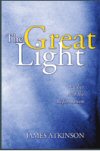
More than 450 years have passed since Luther’s definitive protest at Wittenberg. In this volume, James Atkinson contends the Reformation is Luther, and Luther is the Reformation. Thus, the acid test of any work on this period is whether the author understands and effectively communicates the fundamental concerns of the Reformation’s figurehead. Atkinson sets up a framework with which we may survey and assess the other men and movements of the period. From Luther, Atkinson moves to Zwingli and the Swiss Reformation, to Calvin and the establishment of Protestantism, to the Reformation in Britain under the Tudors, and finally to the beginnings of the discontent that boiled over in the British Puritan revolt of the seventeenth century.
James Atkinson was formerly professor of biblical studies at Sheffield University. He was the founder and director of Sheffield’s center of Reformation studies. its center for Reformation studies. He also served as president of the Society for the Study of Theology, and special professor in Reformation theology at Nottingham University from 1994–2002.
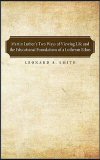
This essay asserts that Luther’s “at-the-same-time,” simul, or paradoxical way of viewing life, does not capture Luther’s thought as a whole, or his way of viewing life based on the power of the word and the spirit of God. Leonard Smith argues that the best way to capture Luther’s “second” basic way of thinking and of viewing life is through the connected prepositions “in, with, and under.” This second basic way was based primarily on the gospel of John and its prologue, which shows how God is acting, creating, and redeeming, and how Jesus is “the Word become flesh.” Smith argues that understanding both of Luther’s ways of viewing life is helpful for understanding Lutheran education and “a Lutheran ethos” since the sixteenth century. This short text can easily be used as a supplementary reading for a class, seminary, or group discussion.
Leonard Smith is a superb scholar of German intellectual history. He has used his work on the German Enlightenment and later periods to add a new dimension to the thinking about the sixteenth-century scholar and reformer, Martin Luther. In particular, Smith argues that Martin Luther’s paradoxical way of thinking and his deep mysticism culminates in the idea that there is a special “Lutheran Ethos,” one that is related to all areas of life, education, vocation, civil and political life.
—Richard G. Cole, emeritus professor of history, Luther College
Luther’s influence continues as a remarkable source of continuous relevance. Smith uncovers yet another dimension. I am grateful for his work.
—Larry Rasmussen, Reinhold Niebuhr Professor Emeritus of Social Ethics, Union Theological Seminary
Some important ideas lie buried just below the surface of intellectual history; obvious to one generation, they become invisible to the next. Leonard Smith’s roots, which reach unusually deeply into German intellectual and cultural life, help him lay bare the most basic epistemological and hermeneutical (and indeed spiritual) assumptions of the founders of modern German history and theology. To hear these thinkers anew, embedded in the Lutheran context they shared, is to hear them fully for the first time since their own era.
—R. Guy Erwin, Gerhard & Olga J. Belgum Professor of Lutheran Confessional Theology, California Lutheran University
Smith offers a penetrating study of Luther’s central insights with an eye on its implications for the cultural role of morality-a fascinating sequence to his Religion and the Rise of History.
—Eric W. Gritsch, emeritus professor of church history, Gettysburg Lutheran Seminary
Leonard S. Smith is emeritus professor of history, California Lutheran University, Thousand Oaks, California.
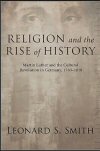
This intellectual history applies the ideal-type, or model-building methodology of Otto Hintze (1861–1940) to Western historical thought. Religion and the Rise of History suggests that, in addition to his paradoxical, simul, “at-the-same-time,” way of thinking and viewing life, Martin Luther also held to a way that was deeply incarnational, dynamic, and “in-with-and-under.” Smith argues that this dual vision and “Lutheran ethos” strongly influenced Leibniz, Hamann, and Herder, and was integral to the rise of a modern form of historical consciousness—commonly called “historicism”—in Protestant Germany.
Leonard Smith’s book is, in its origins and goals, a deeply pedagogical work. He addresses a central problem in the history of eighteenth-century German and European thought, the emergence of a new, evolutionary view of history called “historicism.” Enabled by Luther’s incarnational theology, historicism received its first formulation, Smith argues, from Leibniz and his successors and achieved its public place in the new University of Berlin (est. 1810). This book is a splendid marriage of classical themes with new and original insights. Everyone interested in the evolution of European historical thought should read it.
—Thomas A. Brady Jr., University of California, Berkeley
This book breaks new ground in showing how Martin Luther shaped the philosophical pioneers of a new worldview based upon the study of history. A textbook for minds curious about a philosophy of history.
—Eric W. Gritsch, Gettysburg Lutheran Seminary
A wide-ranging intellectual history of the emergence in Germany of a modern historical consciousness. Smith argues that a Lutheran ethos was especially conducive to this development, as it was transmitted through the use of Luther’s Small Catechism and generations of pastors and teachers. Key figures in this transmission include Leibniz and Hamann, leading to its flowering in Ranke and further elaboration by Hintze and Meinecke in the nineteenth and twentieth centuries. Provocative and engaging.
—Dale A. Johnson, Buffington Professor of Church History, emeritus, Vanderbilt University
Leonard S. Smith is emeritus professor of history, California Lutheran University, Thousand Oaks, California.
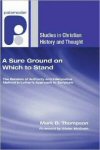
This study from Mark Thompson examines Luther’s most significant comments on the nature and use of Scripture, locating each in its literary and historical context. Thompson explores a series of connections in Luther’s thought, analyzing his scattered statements in terms of four categories reflected in his own terminology: inspiration (inspiratio), unity (tota scriptura), clarity (claritas scripturae), and sufficiency (sola scriptura). Thompson seeks to identify the elements that enable Luther to move with confidence between his statements about the authority of Scripture and his interpretive method.
Mark Thompson forcefully appeals, against different modernizings of the German Reformer, that we “let Luther be Luther” on the doctrine of Scripture itself—its inspiration, unity, clarity, and sufficiency. Luther turns out to be less an anticipation of a modern biblical critic and more a conservative in the lineage of the Fathers and medievals. This is an important corrective interpretation, not least because Luther deployed the Word with such vibrant power. The recovery of the latter in the contemporary church may depend on recapturing the Luther-like confidence in handling Scripture.
—David F. Wright, University of Edinburgh
Nothing is more important for understanding Martin Luther than a grasp of his approach to the Holy Scriptures on which he based his faith and doctrine. In this illuminating study Mark Thompson explains the many different ways in which Luther approached the biblical text and reveals a man whose understanding of God’s Word defies simplistic analysis. In the process he engages with modern Lutherans who have so often appropriated some parts of Luther’s legacy but ignored others. This book will be essential reading for everyone with a serious interest in Luther and in the gospel which he proclaimed.
—Gerald Bray, Beeson Divinity School
Mark D. Thompson is principal and head of the department of theology, philosophy, and ethics at Moore College. He became a priest in the Anglican Church of Australia in 1987, and received his PhD in philosophy from Oxford in 1997.
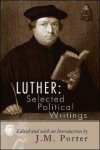
In this text, political scientist J. M. Porter, presents revealing selections from nine of Luther’s important writings. Porter compiles excerpts from Luther’s writings which shaped the Reformation and continue to influence the course of events in our time. They illustrate Luther’s innovative ideas about the nature of temporal authority, political obligation and its limits, church-state relations, and political resistance. These selections reveal the complexity of the reformer’s thinking, its theological base, and the situational focus of his political utterances. Porter also provides a helpful introduction in which he clarifies the meaning and implications of Luther’s famous “two kingdoms” theory, whereby the state is freed both from domination by the church, and from the temptation to dominate the conscience of its citizens.
J. M. Porter taught political science at the University of Saskatchewan in Saskatoon, Canada.
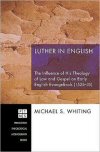
Recent studies have increasingly downplayed, and in a few cases even wholly denied, the influence of Martin Luther’s theology of Law and Gospel on early English evangelicals such as William Tyndale. The impact of a late medieval Augustinian renaissance, Erasmian Humanism, the Reformed tradition, and Lollardy have all but eclipsed the more central role once attributed to Luther. In this text Michael Whiting examines these claims with a thorough reevaluation of Luther’s theology of Law and Gospel in its historical context—spanning twenty-five years, something entirely lacking in all previous studies. Using extensive research of primary sources, paying acute attention to the larger historical narrative, and remaining in dialogue with secondary scholarship, Whiting argues that scholars have often oversimplified Luther’s theology of Law and Gospel. His argument continues that scholars have thus wrongly diminished Luther’s very significant, even principal, influence upon first-generation evangelicals William Tyndale, John Frith, and Robert Barnes during the English Reformation of the 1520s and 1530s.
Martin Luther, the theological giant of the sixteenth century, has almost been written out of the English Reformation. Whiting’s book restores him to his proper place, not least by showing that Luther’s early English interpreters often understood his paradoxical theology better than modern commentators have done. He reminds us of what we should always have known: that a Reformation without Luther is simply unimaginable.
—Alec Ryrie, Durham University
Whiting’s fresh look at the works of three of the most significant inaugurators of the Protestant Reformation in English casts aside the prejudices of the previous generation of scholars and thus opens a new discussion of how the earliest English reformers read and digested Luther’s core insights within the framework of his distinction of law and gospel.. . . This book will command attention from the coming generation of interpreters of the Reformation in the wider European context and specifically in England.
—Robert Kolb, Concordia Seminary, Saint Louis, Missouri
This excellent study shows how Luther’s theology of Law and Gospel greatly influenced the work of Tyndale, Frith, and Barnes. It examines the concept of the Tertius Usus Legis and traces its development in Luther’s own work. Michael Whiting has produced an extremely comprehensive, persuasive, and well-informed study, a high quality work which amply justifies careful attention.
—George Newlands, University of Glasgow
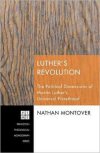
In this volume Nathan Montover discusses how Luther’s universal priesthood is, in part, a radical political doctrine that constitutes a revolutionary strain in Luther’s thinking. Luther’s political understanding of the universal priesthood posed a challenge to the concrete structures of his day, which were built upon a cosmological foundation that came under attack as a result of the Protestant Reformation. Thus, as Montover argues in this text, Luther’s universal priesthood was not simply another evangelical concept that dealt with the office of ministry. It also served as the means for reordering the concept of temporal authority and the temporal order. Viewed this way, the universal priesthood had a political dimension that must be acknowledged if it is to be fully understood.
In Luther’s Revolution, Montover presents a creative, compelling explication of the universal scope of Luther’s vision of the ’priesthood of all believers,’ for in living out their new life in Christ, both structures of the church and the world will be transformed. The author’s use of Luther’s 1520 treatise ’To the German Nobility of the German Nation Concerning the Betterment of the Christian Estate’ offers a promising model for fruitful engagement of Luther’s evangelical theology in the twenty-first century.
—Winston D. Persaud, author of The Theology of the Cross and Marx’s Anthropology
Luther’s Revolution is a provocative and evocative challenge to those who view Luther as someone who distanced himself from revolutionary politics. Montover offers a compelling and well-documented reading of the political implications of the early Luther’s foray into the caste system of the medieval church’s conception of the priesthood. His contention is that Luther’s call for the universal priesthood of all believers entails not only an ecclesial reformation but a conscientious yet radical subversion of dominant territorial politics and entitlements of the time.
—Vítor Westhelle, author of The Scandalous God
In this careful analysis of Martin Luther’s “To the Christian Nobility of the German Nation,” Nathan Montover affirms the traditional scholarly opinion that the doctrine of the universal priesthood has crucial implications for ecclesiology and the doctrine of ministry. However, he also demonstrates convincingly that Luther addressed the political realm and temporal authority in strategic ways in light of this doctrine. Luther is, therefore, presented as a creative political as well as ecclesiastical and theological reformer.
—Kurt K. Hendel, Bernard, Fischer, Westberg Distinguished Ministry Professor of Reformation History, Lutheran School of Theology at Chicago Lutheran School of Theology at Chicago
How was it possible that a man deemed outlaw by the empire and heretic by the papacy could over time become portrayed as a political conservative? Nathan Montover deftly probes the silences in and conventions of Luther research to unveil an alternative figure. Luther’s concept of the universal priesthood of all believers, based on careful analysis of his writings, coheres best with a frontal assault on the pope’s claims to temporal authority and the dismantling of late medieval political cosmology. Luther emerges from this excellent study as a thoroughly political, prophetic, and revolutionary Christian engaged in the struggle for liberation, drawing radical political consequences from foundational theological claims.
—Craig L. Nessan, author of Shalom Church and Beyond Maintenance to Mission
Nathan Montover serves as pastor at St. James Lutheran Church in Bettendorf, Iowa. He also teaches religion at Augustana College in Rock Island, Illinois, and is adjunct instructor of Reformation studies at Wartburg Theological Seminary in Dubuque, Iowa.
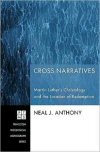
In this text Neal Anthony examines Luther’s radical interpretation of the two natures of Christ, and the ubiquitous presence of the humanity of Christ as a fundamental expression of that same theology. This expression of Luther’s theology of the cross, Anthony asserts, elaborates fully on an important and creative corrective with reference to recent signal expressions of the theology of the cross. As contemporary theologians of the cross have articulated—most notably Douglas John Hall and the late Alan E. Lewis—the theology of the cross is pre-eminently a theology of redemption from within (“within-redemption”). In the process of outlining and analyzing these theologies of within-redemption, Anthony exposes an impasse created by these theologies, regarding the relationship of within-redemption to individual human narratives. Anthony contends that only through Luther’s radical interpretation of the two natures of Christ can complete within-redemption can be expressed. In this text Anthony also evaluates the christology of Karl Barth from the perspective of his findings. Anthony’s work is an innovative and fresh application of Luther’s christology, placing Luther’s christology at the cutting edge of contemporary discussions regarding the theology of the cross and its within-redemption.
In this incisive and creative study, Anthony explores Luther’s, Hall’s, and Lewis’s theologies of the cross and argues convincingly that Luther’s incarnational focus and affirmation of the third mode enable contemporary theologians of the cross to offer the world a powerful theology of hope that both takes seriously the totality and particularity of human experience and celebrates the ongoing nature of God’s ‘within redemption.’
—Kurt K. Hendel, Bernard, Fischer, Westberg Distinguished Ministry Professor of Reformation History, Lutheran School of Theology at Chicago
Any theologian who is willing to pay attention to Martin Luther on Christ’s Presence is by necessity exciting. Especially when that theologian takes seriously the ubiquitous presence of the crucified Christ to his sinners that concerns not Christ’s presence to us, but ours to him. Neal Anthony’s theological exploration is indeed exciting. Read freely.
—Steven D. Paulson, professor of systematic theology, Luther Seminary, St. Paul, Minnesota
Knowledgeable when it comes to Luther, Barth, and other significant theologians; creative when it comes to traditional topics of Christian doctrine; faithful when it comes to the relevance of research and teaching for ministry; challenging when it comes to the reader’s own reflection.
—Antje Jackelén, Bishop of Lund, Church of Sweden
Neal J. Anthony is an ordained pastor in the Evangelical Lutheran Church in America, currently serving in Nebraska. He received his PhD in theology at Lutheran School of Theology at Chicago in 2008, and has taught at Midland Lutheran College.
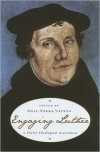
This volume compiles articles written by scholars affiliated with the project known as “the New Finnish Interpretation of Luther.” Topics of study include Luther’s theological anthropology, christology, Trinity, sacraments, faith, theology of the cross, the virgin Mary, sexuality, music, and the spiritual reading of the holy Scriptures. Included studies explore the ways Luther remains a fully Catholic and genuinely Augustinian theologian, how he could be a representative of classical Christianity, how Luther’s theology fits in dialogue with currents like communitarianism or Radical Orthodoxy, and much more.
This compelling volume continues the ground-breaking project known as the ‘new Finnish interpretation of Luther.’ It is the contention of this movement that, for Luther, union with Christ in faith necessarily entails active and robust participation in God’s own life. Building upon the reformer’s unique vision, at once evangelical and catholic, this book offers powerful contributions to contemporary theology and renewed sustenance for ecumenical advances. Highly recommended.
—Thomas G. Guarino, Seton Hall University
For over twenty years a remarkable group of Finnish scholars has been offering a new interpretation of Luther’s theology. Here for the first time in English these theologians give us not only a presentation of their challenging approach to Luther research, but a splendid introduction to Luther’s theology as a whole. Beginners and experts alike will find much to ponder in the Luther who speaks from these pages.
—Bruce Marshall, Perkins School of Theology, Southern Methodist University
Olli-Pekka Vainio is adjunct professor of ecumenical theology at the University of Helsinki, and a member of the Center for Theological Inquiry, Princeton. He is the author of Justification and Participation in Christ and Beyond Fideism: Negotiable Religious Identities.
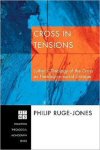
In this text, Philip Ruge-Jones maps the power relationships that Luther’s theology addressed and turns to specific works that challenge established structures of his world. Ruge-Jones explores how Luther’s Latin texts undermine the ideological assumptions and presumptions that bolstered an opulent church and empire, how Luther uses the cross of Christ to challenge what he called volatilem cogitatum, “knowledge that is prone to violence.” Ruge-Jones also discusses how Luther’s German writings—directed to a broader, more popular audience—focus this critique of human pretensions into an attack on systems of wealth, status, and power that refuse to look with compassion upon the many domestic servants of Germany. Finally, analyzing his popular pamphlets, Ruge-Jones highlights how the visual images show, with graphic specificity, that throughout his life Christ sought out solidarity with the least—contrasting brutally with images of a church consumed by chasing wealth, political influence, military power, and status.
Candor and precision conjoined with a lucid exposition of complex historical arguments is what the reader will be treated to in Philip Ruge-Jones’ Cross in Tensions. The book engages the development of the early Luther’s theology of the cross and its various interpretations with poignant care for the pain of the world while being in compassionate and hopeful solidarity with those who, moved and shaken, endure the cross in all its tensions, gruesomeness, and intentions.
—Vítor Westhelle, author of The Scandalous God
Philip Ruge-Jones makes an interesting and thoughtful contribution to the contemporary scholarly literature on Martin Luther’s theology of the cross by offering a contextually informed analysis of the Reformer’s thought. . . . He places Luther’s writings into their . . . contexts and clarifies the impact of those contexts on the reformer’s works. . . . Ruge-Jones is not only sensitive to Luther’s context, however. . . . Ruge-Jones is a Euro-North American who has lived in South America and whose theological perspectives have been profoundly impacted by Latin American Liberationist thought, particularly the notion of the preferential option of the poor. . . . He views the theology of the cross as a theology that points to the crucified Christ as God’s ultimate self-revelation and that is liberating good news to the poor and marginalized. Hence, he celebrates Luther as a true theologian of the cross whenever the reformer and his writings advocate for the poor, and he criticizes Luther as a theologian of glory whenever the Reformer uses his writings to support those in power and to oppress the common people.
—Kurt K. Hendel, Bernard, Fischer, Westberg Distinguished Ministry Professor of Reformation History, Lutheran School of Theology at Chicago
Philip Ruge-Jones is associate professor of theology at Texas Lutheran University in Seguin, Texas. He is the author of The Word of the Cross in a World of Glory.
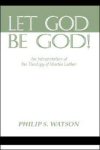
In this text Philip Watson asserts that similar to Copernicus’ challenge of the notion that the sun moved around the earth, Luther challenged the teaching that mortals were at the center and that everything moved around them, claiming that God is the center and without him, humanity is nothing. Human salvation lies not in things mortals do, but in what God does. This point is the foundation for Watson’s theme in Let God Be God: let humanity recognize God’s will and way. The first part of Let God Be God evaluates Luther as a theologian and points out the motif of his thought. The book proceeds to concentrate on three major themes in Luther: the revelation of God, the theology of the cross, and the doctrine of the Word. Those already acquainted with Luther will find this interpretation of his lectures, writings, and sermons particularly stimulating.
Philip S. Watson has served as professor of systematic theology at Garrett Theological Seminary in Evanston, Illinois.
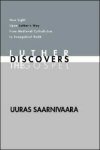
In this text, Uuras Saarnivaara examines the question: when did Luther discover the gospel of free justification and salvation, and what did this discovery mean?
Uuras Saarnivaara (1908-1998) was born in Finland, and worked in parish ministry there. He received a ThD from the University of Helsinki, as well as a PhD at the University of Chicago, where he wrote his dissertation on Luther, the text included here. Saarnivaara was a prolific author, writing books including: Scriptural Baptism, Hath God Said: Who is Right—God or the Liberals?, Armageddon—Before and After, andThe Lutheran Confession and Martin Luther: Can the Bible be Trusted?
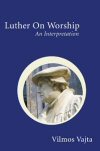
In this text, Vilmos Vajta presents a thorough study of Luther’s thoughts on worship. This work provides insights interesting to Lutheran scholars, as well as engaging material relevant to Christian life and worship today.
Vilmos Vajta was the first director of the Lutheran World Federation’s department of theology and later a research professor at the Institute for Ecumenical Research in Strasbourg, France. A multilingual ecumenical scholar who spent much of his career outside his native Hungary, Vajta wrote theological works in German, English, Swedish, Hungarian and French. He served as Lutheran World Federation’s theology director from 1952–1963 and was on the staff of the Strasbourg Institute from 1963 until his retirement in 1981.
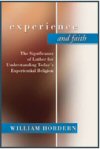
In Experience and Faith William Hordem examines the intersection of faith and experience in Luther’s theology, offering insights from the reformer’s works emphasizing the importance of understanding Luther in the context of today’s experiential religion.
William Hordem is professor emeritus at Lutheran Theological Seminary, Saskatoon, and the author of A Layman’s Guide to Protestant Theology, Speaking of God, Introduction to Theology, and Experience and Faith.